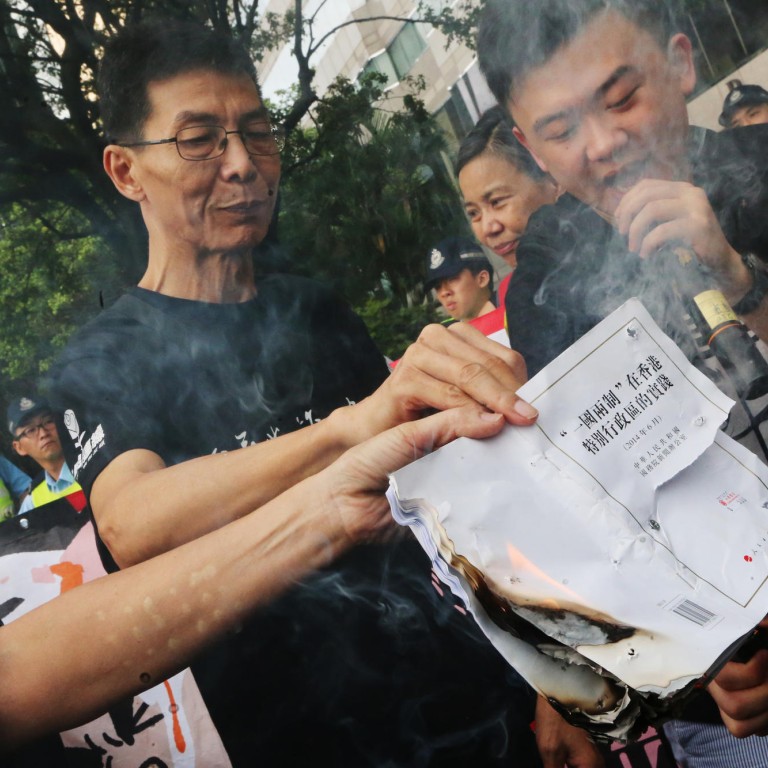
Markets more focused on what Hong Kong could lose than universal suffrage
Hong Kong's stability and thriving economy can only be maintained if its rule of law and global governance standards are upheld in the long run
I am often asked, "has Hong Kong changed since you have been here?" "Er … yes." We all know the enormous changes that have occurred since the second world war as conflict, famine and depopulation were replaced by peace and stability.
Revolution north of the Shenzhen River brought refugees, desperate for a fair chance. Ironically, these refugees are the parents and grandparents of most long-term residents of Hong Kong. For many of them, Hong Kong was never the destination, just a transit lounge for the West.
[HK’s] special characteristics are worth fighting to maintain
It took 50 years for them to turn Hong Kong into a manufacturing miracle and then a global financial centre and an attraction in itself, a place to work and prosper. Over time we have evolved a separate Hong Kong culture, part international, part worryingly parochial, as our educated and flexible population benefited from freedom of thought, speech, ideas and action.
The State Council white paper on the future of one-country, two-systems has accelerated change, pulling Hong Kong much more closely into Beijing's orbit. In my 45 years' recollection, changes in attitude and confidence have occurred much faster since June than from any other single event, including stock market crashes, severe acute respiratory syndrome and the handover. We might call it DAB - direct administration from Beijing - and it requires hard thinking by investors to extrapolate the new environment.
Oddly the white paper, which is a "suggestive document", almost replicates the British administration, where the sovereign power looked after the big issues (and stayed out of local ones) and the local government made itself useful; ensuring fairness and a level playing field, planning for the future, and making sure the MTR ran on time.

This should be no surprise. Beijing is the sovereign power and can do what it likes with Hong Kong. However, there are still good reasons for Beijing to avoid confrontation with a well-educated and free-thinking population used to certain freedoms, so we may win a wider franchise.
The mainland benefits from having an enclave to assist its development, a state within a state which has its own taxes and laws. France has Monaco and Britain has Jersey. It can be useful as a petri dish for creative political, economic and financial experiments.
However, try telling the cities of Beijing or Shanghai that Hong Kong should have a preferred status. It is only the 14th largest city in China. If Hong Kong can elect its mayor by universal suffrage - universally meaning "one man, one vote", will not Beijing and Shanghai want the same? This is not to say that Hong Kong people should not continue to make their views known, but this should remain a forceful but loyal opposition. Occupy Central has been spun into a force by pro-mainland voices but is likely to have little long-term influence as a movement. The Democrats will take their fight for universal suffrage to 2022 and will regroup and plan for next time, much like any losing party. By then a new generation of players will be fighting the issues on both sides.
More important is not whether the fight has been lost on something that we did not have in the first place (democracy), but whether we lose the things that make Hong Kong special.
The markets are much more concerned about Hong Kong losing the benefits and freedoms that we currently enjoy, such as an independent judiciary, business-friendly tax policies, the Independent Commission Against Corruption and Securities and Futures Commission, the currency peg that makes us attractive globally, the ability to freely move money in and out, and the absence of blocked internet sites out of morality or security.
These things keep global businesses, and their international lawyers, accountants, bankers, surgeons and engineers thriving in Hong Kong. Our economy and stability will only be maintained if we keep our reputation for fairness and global standards of governance.
Investors should observe the Hong Kong government to see if it can transform the special administrative region into the world's third-biggest financial hub. Success here will help protect the neck of the golden goose being cut by over-interference.
They should remember that Singapore is ready, willing and able to accept a brain drain and a flight of capital from Hong Kong. Our special characteristics are worth fighting to maintain.

